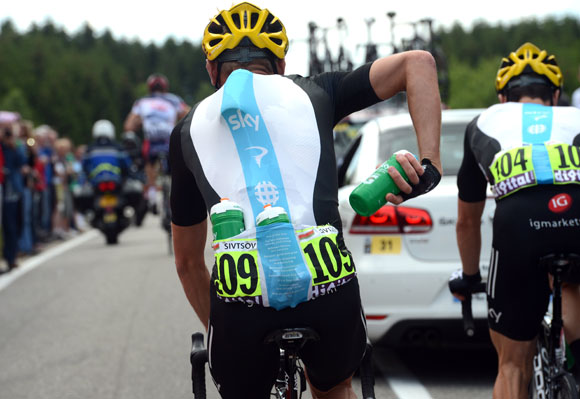Man down: how crashes shape the Tour
Losing Kanstantin Siutsou is a blow for Sky but it's how they respond that counts
Words: Lionel Birnie in Rouen
Wednesday July 4th 2012

One of the cornerstones of Dave Brailsford's philosophy is to control the the things that are controllable. That means taking care of every detail that is within his influence and eliminating from his thoughts, as far as possible, those things he cannot change. The ethos runs through the Sky team, although some are more natural adopters of the theory than others.
After two cautious road stages during which the bunch appeared to have struck a pact to keep calm and stay safe, the third stage from Orchies to Boulogne-sur-Mer was a nervy affair more typical of the Tour's opening week.
Everyone knows that the first job for any overall contender is to avoid the crashes. Last year, with the first week drawing to a close, Bradley Wiggins found to his cost that disaster can strike at any time. On the road to Châteauroux he fell in a crash on a straight but narrow road as the bunch wound up for the intermediate sprint. And that was it, the Tour was over.
British fans probably feared the worst yesterday when they saw television pictures of a rider in a Sky jersey sitting in the middle of the road after a crash with around 40 kilometres to go. As the camera zoomed in, we could see the faller was not Wiggins but his team-mate Kanstantsin Siutsou. He pulled out of the race on the spot and it was later revealed he had broken his left tibia.
The latest race content, interviews, features, reviews and expert buying guides, direct to your inbox!
Losing Siutsou four days into the race is undoubtedly a blow. The Belarussian would have been one of Sky's workhorses in the mountains, slotted into the order of things somewhere between Michael Rogers and Chris Froome.
But the consequences are more subtle than that. A Tour de France campaign stands and falls on moments like that. As the race goes on, the workload will be spread among seven riders rather than eight. It doesn't sound like much, but reduced to bare numbers, that means each remaining domestique has to do around 14 per cent more work. That means everyone will have to absorb more responsibility. The men who drop back for bidons – the plastic water bottles used by the riders – will find they have to make a few more trips to the team car. When it comes to setting the pace on the front of the bunch later in the race, each Sky man will have to ride that bit further. And if someone else crashes or gets sick, then the workload increases again. In a three-week Tour it all adds up.
And that is one of the factors in the Tour that is often overlooked. Think back to last year and the way Cadel Evans was supported by BMC Racing. Evans's team-mates were Brent Bookwalter, Marcus Burghardt, George Hincapie, Amaël Moinard, Steve Morabito, Manuel Quinziato, Ivan Santaromita and Michael Schär. An honest appraisal of those men is to say they are closer to the 'water carriers' end of the spectrum than the 'stars' end.
That is to underestimate their input because they supported Evans brilliantly, without it always being obvious. All eight men made it to Paris in one piece too.
As much as the idealists want the Tour to be a pure test of strength, it is important to recognise that fortune plays a huge part.
Siutsou was in the wrong place at the wrong time on Tuesday but Sky will of course be grateful that it wasn't Wiggins who was there instead. The flip side was that Wiggins was halted by the crash in the final kilometre, which spared him a few moments of intense effort.
That may seem insignificant in the grand scheme of things but it all builds up.
BMC's manager John Lelangue made what appeared to be an obvious comment at the end of the stage in Boulogne-sur-Mer. "All our team stayed out of trouble and that is what we needed," he said. "I've said since October that you need a solid Classics team for the first week of the Tour and that's what we have. We're stronger than last year."
Lelangue's words sound blindingly obvious but the importance of being at full strength cannot be overlooked. Being a man down will force Sky to think more carefully about how they deploy their resources as the race gets deep into the second week. Losing Siutsou will undoubtedly turn out to be a factor but the key to any Tour de France victory is working out how to minimise losses by papering over the inevitable cracks.
No one can control the Tour's chaos. It is part of the race's DNA. Siutsou's crash was outside Sky's control. How they react to it is definitely within their sphere of influence.
Cycle Sport’s Tour village: All our Tour coverage, comment, analysis and banter.
Follow us on Twitter: www.twitter.com/cyclesportmag
www.twitter.com/lioneljbirnie
Edward Pickering is a writer and journalist, editor of Pro Cycling and previous deputy editor of Cycle Sport. As well as contributing to Cycling Weekly, he has also written for the likes of the New York Times. His book, The Race Against Time, saw him shortlisted for Best New Writer at the British Sports Book Awards. A self-confessed 'fair weather cyclist', Pickering also enjoys running.